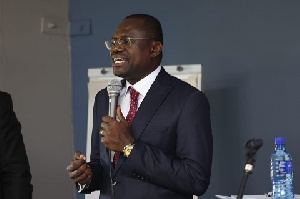General News of Saturday, 13 July 2019
Source: kasapafmonline.com
We’ve suffered enough, speed up NAM1’s trial – Menzgold customers beg government
Aggrieved customers of defunct gold dealership firm, Menzgold have appealed to government to ensure a speedy trial of the CEO, Nana Appiah Mensah aka NAM 1 to ensure their locked up funds are paid back to them as soon as possible.
According to them, now that the embattled CEO has arrived in Ghana there should be absolutely no feet dragging in the process to retrieve the funds.
“All we are saying is that the government should speed up with the process for the sake of Ghanaians who are dying because they have their funds locked up with Menzgold. We appeal to the government to sit down with NAM 1 and draw up a plan to pay us the customers. We’ve suffered enough and we can’t wait any longer for the conclusion of this matter,” Nana Baffuor, Spokesperson for Aggrieved customers in the Ashanti Region told Akwasi Nsiah on Ghana Kasa on Kasapa FM.
Meanwhile, a private legal practitioner and vocal Menzgold investor, Maurice Ampaw says government maintaining the option of a lawsuit against Nana Appiah Mensah could frustrate efforts to settle customers’ locked up investments.
“The way forward is not about prosecution; the way forward is how best we can retrieve customers locked up investment. We can take him to court to secure bail for him, but immediately after the court bail, the Police should take advantage of the Alternative Dispute Resolution(ADR) meaning out of court settlement declared by the Chief Justice and to be promoted by all the courts, so that all stakeholders can meet NAM 1 and see how best he can mobilize resources in settling his customers,” he told Kasapa 102.5 FM.
An Accra High Court on Friday remanded NAM 1 into Police custody after the Criminal Investigations Department(CID) of the Police Service arraigned him.
According to the charge sheet, NAM 1 is standing trial for defrauded 16,000 customers of GHC1.68 billion.












